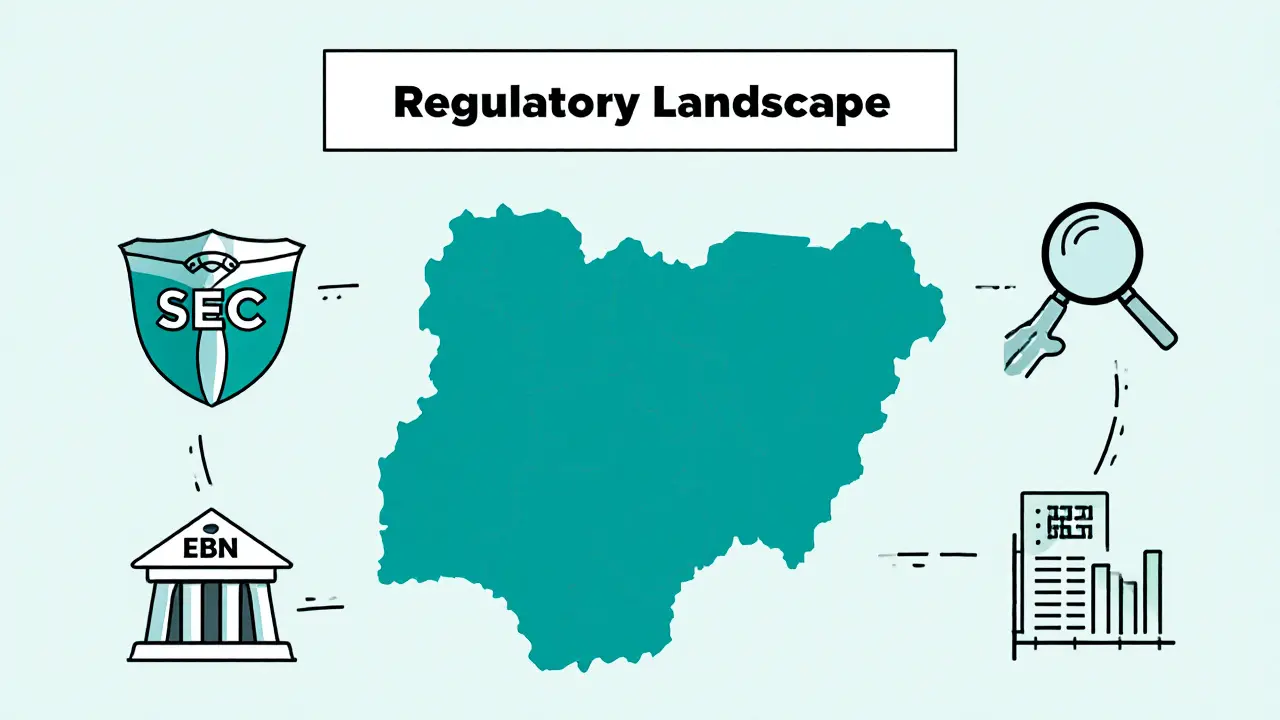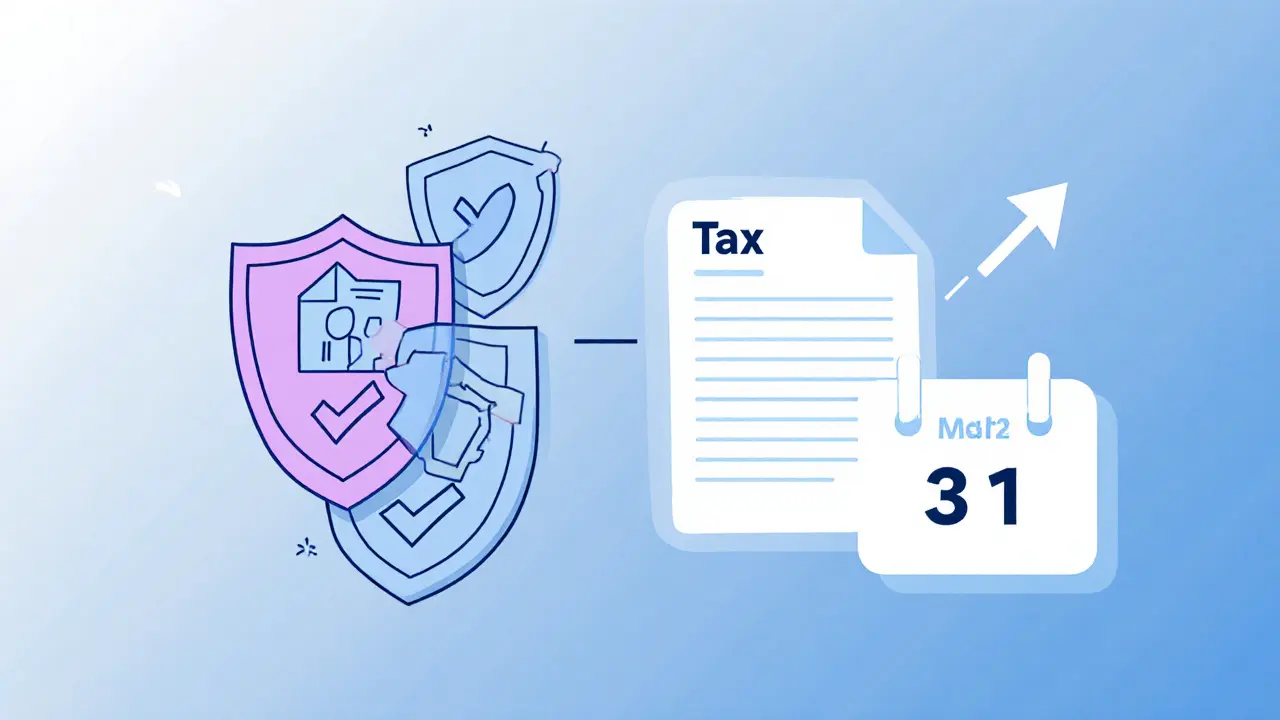How to avoid crypto restrictions in Nigeria - Practical guide for 2025
 Feb, 5 2025
Feb, 5 2025
Nigeria Crypto Tax Calculator
Quick Takeaways
- Use only SEC‑licensed Virtual Asset Service Providers (VASP) to keep your activities legal.
- Deploy robust KYC/AML procedures if you run a crypto business.
- Pay attention to the 2025 tax rules - profits are taxed, but losses can offset other income.
- Leverage peer‑to‑peer (P2P) platforms cautiously; they are riskier under the new enforcement framework.
- Stay updated on upcoming DeFi and stablecoin regulations to avoid future penalties.
When navigating the crypto restrictions in Nigeria the set of rules and enforcement actions that limit how digital assets can be used, traded, or held within the country, the goal is not to break the law but to work within the boundaries while still enjoying the benefits of digital finance. Since the Investments and Securities Act 2025 Nigeria’s new legal framework that classifies digital assets as securities and grants licensing authority to the SEC, the crypto ecosystem has shifted from a gray‑area to a regulated space. Below is a step‑by‑step playbook for individuals and small businesses who want to stay compliant and avoid unnecessary restrictions.
1. Know the regulatory landscape - who controls what?
The main oversight bodies are:
- Securities and Exchange Commission (SEC) Nigeria’s primary regulator for crypto exchanges and token offerings
- Central Bank of Nigeria (CBN) The nation’s central monetary authority that lifted the 2017 banking ban in late‑2023
- Economic and Financial Crimes Commission (EFCC) Agency tasked with combating fraud and money‑laundering in the crypto sphere
- Nigerian Financial Intelligence Unit (NFIU) Collects and analyses suspicious transaction reports for AML compliance
The SEC issues the Virtual Asset Service Provider (VASP) Guidelines A set of requirements that licensed exchanges must follow to access banking services. Any platform without a VASP license is considered illegal and subject to enforcement, which can include account freezes, fines, or criminal prosecution.
2. Choose a licensed exchange - the safest route
Only a handful of exchanges have cleared the SEC’s vetting process. As of October 2025, the most prominent licensed platforms are:
- Quidax A Nigerian‑based exchange that offers fiat on‑ramps, KYC verification, and direct bank integration
- Busha Provides crypto‑to‑fiat conversion, a mobile app, and compliance reporting tools
These platforms meet the following baseline criteria:
- SEC‑issued VASP license.
- Full KYC/AML onboarding, including biometric verification.
- Regular transaction reporting to the NFIU.
- Bank‑linked accounts that allow seamless NGN deposits and withdrawals.
Using a licensed exchange shields you from the CBN’s historic banking restrictions and gives you a legal channel to move funds in and out of the crypto ecosystem.
3. If you run a crypto business - build compliance from day one
Start‑ups often think compliance is an after‑thought. In Nigeria, the cost of non‑compliance far outweighs the initial setup effort. Follow this checklist:
- Register with the SEC. Submit the VASP application, corporate charter, and proof of capital (minimum ₦50 million).
- Implement KYC. Collect full name, government ID, biometric data, and source‑of‑funds questionnaire. Store records for at least five years.
- Deploy AML monitoring. Use transaction‑screening tools that flag structuring, rapid turnover, and links to high‑risk jurisdictions.
- Report suspicious activity. File SARs (Suspicious Activity Reports) to the EFCC within 72 hours of detection.
- Maintain audit trails. Log every user action, API call, and wallet address change. The SEC can request these logs during an audit.
Failure to meet any of these points can trigger license revocation, heavy fines, or criminal charges.
4. Peer‑to‑peer (P2P) trading - a double‑edged sword
P2P platforms surged when banks blocked crypto transactions in 2017. After the 2023 policy reversal, they remain popular, but the regulatory net is tightening. Here’s how to stay safe:
- Trade only with users who have verified identities on reputable P2P marketplaces (e.g., Binance P2P, Paxful).
- Avoid large single‑transaction volumes; split them into ≤ ₦500,000 blocks to reduce AML red flags.
- Keep a paper trail: screenshots of chats, payment receipts, and wallet addresses.
- Know that the EFCC now monitors P2P chat groups; repeated violations can lead to account bans and legal action.
While P2P can bypass banking delays, it offers no consumer protection. If the transaction goes wrong, you have limited recourse.
5. Decentralized finance (DeFi) and stablecoins - emerging risks
The current ISA 2025 does not explicitly cover DeFi protocols or algorithmic stablecoins. However, the SEC has signaled future expansion. Until formal guidance arrives, treat these assets as high‑risk:
- Do not deposit funds into unlicensed DeFi pools that promise unrealistically high yields.
- If you hold stablecoins, prefer those backed by NGN reserves and issued by a licensed VASP.
- Keep detailed records of every smart‑contract interaction - they may become audit material.
Proactive reporting of DeFi activity can demonstrate good faith and may protect you from later penalties.
6. Tax obligations - what you need to declare
From January 1 2026, crypto profits are taxable under the Nigerian Tax Act 2025. The key points are:
- Individual taxpayers: Capital gains are added to personal income and taxed on a sliding scale up to 25%.
- Corporate taxpayers: Crypto‑related revenue is subject to corporate income tax - 20% for profits between ₦25 million and ₦100 million, 30% above that threshold.
- All crypto businesses must charge 7.5% VAT on transaction fees.
- Losses from crypto trades can be offset against other capital gains, reducing overall tax liability.
To stay compliant:
- Use accounting software that integrates blockchain transaction data (e.g., CoinTracking, Koinly).
- Generate monthly statements showing cost basis, sale price, and net gain/loss.
- File the annual crypto schedule with your tax return before March 31 2027.
Ignoring tax duties can attract penalties up to three times the owed tax, plus interest.

7. Build a risk‑mitigation plan
Even with full compliance, operational risk remains. Follow this three‑layer approach:
- Technical safeguards: Multi‑factor authentication, cold‑storage for > 70% of holdings, and regular penetration testing.
- Legal safeguards: Retain a law firm experienced in ISA 2025 and maintain updated licensing documentation.
- Reputational safeguards: Publicly disclose your compliance policies, and respond promptly to any regulator inquiries.
By demonstrating a robust governance framework, you lower the likelihood of enforcement actions.
8. Future outlook - what’s likely to change?
Analysts expect the SEC to broaden the VASP definition to include DeFi aggregators and stablecoin issuers by 2027. Keep an eye on:
- Potential licensing requirement for any smart‑contract platform that offers token swaps to Nigerian residents.
- Possible introduction of a “Digital Asset Tax Withholding” where exchanges automatically deduct tax at point‑of‑sale.
- Regional convergence - Nigeria may serve as a template for West African fintech regulations, creating cross‑border licensing opportunities.
Staying updated through SEC newsletters and industry webinars will help you adapt before new rules become mandatory.
Comparison: Licensed vs. Unlicensed Crypto Operations
| Aspect | Licensed (SEC‑approved) | Unlicensed |
|---|---|---|
| Regulatory status | Fully legal, subject to periodic audits | Illegal; risk of shutdown, fines, or prosecution |
| Banking access | Direct NGN deposits/withdrawals via partner banks | Bank accounts frozen; must rely on cash or informal channels |
| Consumer protection | Dispute resolution through SEC, insurance options | No recourse if funds are lost or platform disappears |
| Tax reporting | Automated transaction statements for tax filing | Self‑generated records; high audit risk |
| Compliance costs | License fee (≈ ₦5 million) + ongoing KYC/AML expenses | Lower upfront cost but potentially massive legal fees later |
Next steps - put the plan into action
1. Sign up with a licensed VASP. Complete KYC, link your bank, and start small trades to test the workflow.
2. Set up compliance tools. Integrate an AML screening API and schedule quarterly audits.
3. Record every transaction. Export CSV statements monthly and store them securely.
4. File taxes on time. Use a qualified accountant familiar with crypto tax law.
5. Monitor regulatory updates. Subscribe to SEC newsletters and attend fintech webinars.
Do I need a SEC license to own crypto as an individual?
No. Individual owners can hold crypto in personal wallets without a license. However, buying or selling through a platform requires that the platform itself be licensed. If you run a business that offers crypto services, you must obtain a VASP license.
Can I still use peer‑to‑peer trading after the 2025 regulations?
Yes, but EFCC monitoring has increased. Keep交易 amounts modest, verify counterparties, and retain evidence of each deal. Repeated large P2P trades may trigger investigations.
What are the penalties for operating without a VASP license?
The SEC can impose fines up to ₦10 million, seize assets, and pursue criminal charges that may lead to imprisonment of up to three years.
How do I calculate my crypto tax liability?
First, determine the cost basis of each asset (purchase price plus fees). Subtract this from the sale proceeds to get the gain or loss. Add all gains to your total taxable income. Apply the personal income‑tax brackets (up to 25%). Losses offset other capital gains.
Will future DeFi regulations affect my current holdings?
Potentially. If the SEC expands VASP licensing to DeFi aggregators, platforms that do not obtain a license could be shut down, and users may lose access to funds. Stay tuned to SEC bulletins and consider moving assets to licensed custodial services when guidance is released.
Kirsten McCallum
October 25, 2025 AT 11:36Henry Gómez Lascarro
October 25, 2025 AT 19:44Will Barnwell
October 26, 2025 AT 05:40Lawrence rajini
October 26, 2025 AT 14:04Matt Zara
October 26, 2025 AT 21:43Jean Manel
October 27, 2025 AT 12:15William P. Barrett
October 27, 2025 AT 22:24Cory Munoz
October 28, 2025 AT 14:40Jasmine Neo
October 28, 2025 AT 17:32Ron Murphy
October 29, 2025 AT 06:20Prateek Kumar Mondal
October 30, 2025 AT 00:50Nick Cooney
October 30, 2025 AT 17:06Clarice Coelho Marlière Arruda
October 30, 2025 AT 20:08Brian Collett
October 31, 2025 AT 19:59Allison Andrews
November 1, 2025 AT 11:33Wayne Overton
November 2, 2025 AT 10:06Alisa Rosner
November 2, 2025 AT 13:40MICHELLE SANTOYO
November 3, 2025 AT 03:50Lena Novikova
November 3, 2025 AT 19:23